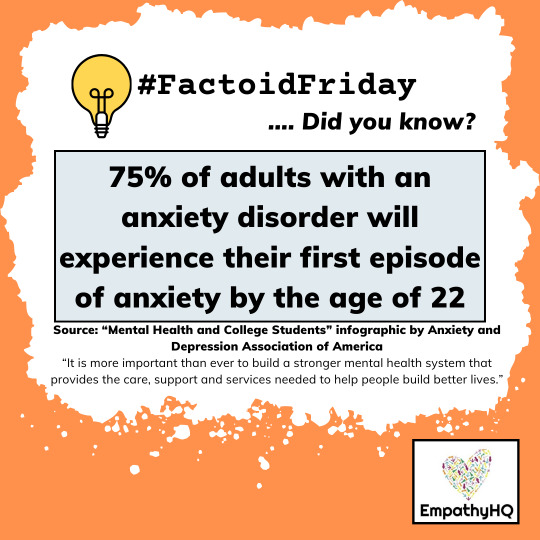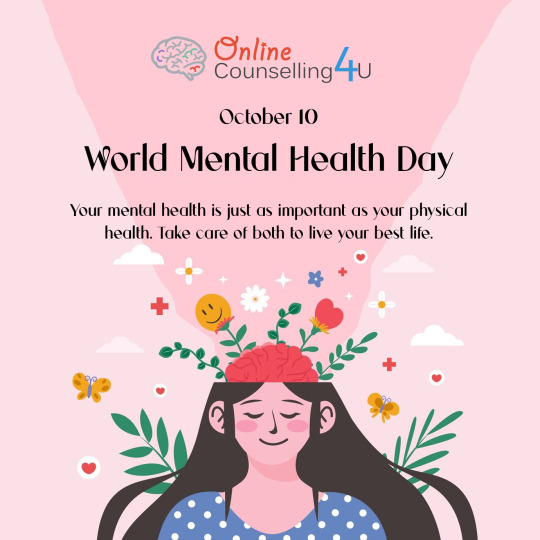#mentalhealtheducation
Text
your 'odd' trauma responses doesn't make you a bad person
i love you. its okay to be angry.
#mentalillnesses#mental health#mental wellbeing#npd#aspd#delusions#did#osdd#complex dissociative disorder#depression#anxi4ty#mentalhealtheducation#ableism#ableists dni#psychosis#schizotypal#schizophrenia#actually bpd#actually dissociative#actually traumatized#trauma#ptsd#cptsd#mental heath support#mentalheathawareness#mens mental health
33 notes
·
View notes
Text
"The Mental Health Impact of Technology: What Science Tells Us"🧠💻
There is no doubt that technology has had a significant impact on society and the way we live our daily lives. From the way we communicate with each other, to the way we access information and entertainment, technology has changed the way we interact with the world around us. However, the rapid pace of technological advancement has also had an impact on our mental health. In this article, we will explore the 10 effects of technology on mental health.

#mentalhealthawareness#technology#mindfulness#wellness#selfcare#mentalhealthmatters#mentalhealth#health#mentalhealtheducation#mentalhealthtips#digitalwellness
2 notes
·
View notes
Photo

//so many heavy untold thoughts ⊙﹏⊙ . . . #emotionscoach #mentalhealthmatters #feelings #follow4followsback #mentalhealthcoach #quotesandsayings #mentalhealth #mentalhealtheducation #emotions #thoughtsbecomethings #feelingsexy #mentalhealthadvocate #quotesaboutlove #quotesaboutlifequotesandsayings #quotes #quotesbangsat #emotionsart #thoughts #mentalhealthday #mentalhealthsupport #mentalhealthblogger #mentalhealthawarenessmonth #thoughtsoftheday #quotesaboutlife #emotionscity #mentalhealthrecovery #mentalhealthawareness #feelingsad #quotesberkelasbangudi #feelingsquotes (at India) https://www.instagram.com/p/CjmN8dQJnuF/?igshid=NGJjMDIxMWI=
#emotionscoach#mentalhealthmatters#feelings#follow4followsback#mentalhealthcoach#quotesandsayings#mentalhealth#mentalhealtheducation#emotions#thoughtsbecomethings#feelingsexy#mentalhealthadvocate#quotesaboutlove#quotesaboutlifequotesandsayings#quotes#quotesbangsat#emotionsart#thoughts#mentalhealthday#mentalhealthsupport#mentalhealthblogger#mentalhealthawarenessmonth#thoughtsoftheday#quotesaboutlife#emotionscity#mentalhealthrecovery#mentalhealthawareness#feelingsad#quotesberkelasbangudi#feelingsquotes
5 notes
·
View notes
Text
Unlock the secrets of the mind with Psychology Tuition in Singapore by Kiya Learning. Whether you're studying for exams or curious about human behavior, our experienced tutors offer personalized instruction and support.
#PsychologyClassesSG#SingaporePsychology#PsychologyEducation#BehavioralScience#SingaporeEducation#PsychologyTuition#PsychologyWorkshops#SingaporeSchools#MentalHealthEducation#CognitiveScience#SingaporeLearningHub#PsychologyEnrichment#EducationForAll#MindAndBehavior#PsychologySkills#UnderstandingTheMind#PsychologicalWellness#SingaporeMindfulness#PsychologyCommunity#EmotionalIntelligence
0 notes
Photo

📈💚 Factoid Friday: Investing in mental health education creates awareness and reduces stigma. Let's educate and empower.
0 notes
Text
2024 Crisis Alert: The Harsh Reality of Anxiety in College Students and How to Fight Back

Introduction to Anxiety in College Students:
As we approach the year 2024, the anxiety crisis in college students is more prevalent than ever before. Studies show that anxiety in college students has reached an all-time high, affecting not only their academic performance but their overall well-being as well.
At times it can be overwhelming to manage the various stressors college life presents, leading to feelings of anxiety, panic, and even depression.
Students Overall Wellbeing
That's why it's crucial to address this issue and provide strategies for managing anxiety in college. In this article, we will explore the concept of anxiety in college students, the factors that contribute to it, and its impact on student well-being.
We'll also provide practical tips and resources for coping with anxiety and navigating the challenges of college life.
Key Takeaways
- Anxiety in college students has reached an all-time high, affecting their academic performance and overall well-being.
- The college environment presents unique challenges and stressors that contribute to anxiety.
- Mental health support on college campuses and resources for students are crucial for managing anxiety.
- Self-care practices, seeking social support, and building resilience skills can help students cope with anxiety.
- The stigma surrounding mental health must be addressed to encourage students to seek help for anxiety.
Understanding Anxiety in College Students
Anxiety is a common mental health condition characterized by persistent feelings of worry, fear, and nervousness.
College students are particularly susceptible to anxiety due to the unique challenges and stressors associated with academic and social life.
According to recent studies, over 40% of college students suffer from anxiety, making it the most prevalent mental health condition among this population.

Anxiety in College Students Image Credit: Photo by Yaroslav Shuraev: https://www.pexels.com/photo/students-sitting-on-a-library-9490226/
Anxiety in College Students - Main Factors
There are many factors that contribute to anxiety in college students, including academic pressures, social challenges, financial stress, and transitional periods.
These factors can be overwhelming and lead to negative consequences for student well-being. It's essential to understand the impact of anxiety on college students and recognize the signs and symptoms of this condition.
Anxiety symptoms can manifest in different areas of a student's life, such as:
- Difficulty concentrating
- Social isolation
- Physical symptoms (e.g., headaches, stomachaches)
- Restlessness or irritability
- Sleep disturbances
At times, anxiety can affect the academic performance of a college student. They may struggle with assignments, procrastinate, or avoid social situations altogether. Consequently, it's essential to seek help if symptoms persist, interfere with daily activities or cause significant distress.
Research indicates that addressing anxiety in college students is more important than ever, as studies show that the problem is on the rise.
Anxiety and Everyday Life
Stressors
Effects of Anxiety
Academic pressures (e.g., exams, grades, deadlines)
Difficulty concentrating and finding motivation
Social challenges (e.g., making friends, relationships)
Social withdrawal and isolation
Financial stress (e.g., loans, work-study, job loss)
Difficulty managing finances and worries about future employment
Transitional periods (e.g., moving, changing majors, leaving home)
Feelings of uncertainty, homesickness, and difficulty adapting to new situations
Overall, anxiety is a complex disorder that affects college students profoundly. It's essential to understand its nuances, the factors that contribute to it, and its effects on a student's daily life. The next section will discuss the importance of mental health support on campus and the availability of resources for students.
The Importance of Mental Health on Campus
https://www.youtube.com/watch?v=fkhyTQz7fSQ
At our universities and colleges, mental health on campus should be a top priority in supporting students' overall well-being.
Stressful academic and social demands can significantly impact an individual's mental health. Therefore, it is vital to provide adequate resources to help students cope with and overcome their challenges.
Thankfully, there are plenty of anxiety resources for college students, including campus counseling services, peer support programs, and other mental health services.
By providing various resources, we can ensure that every student has access to the necessary help and support they need to manage their anxiety effectively.
Seek college counseling services to cope with anxiety in college students.
At most colleges and universities, mental health services like College Counseling Services are readily available to all students and covered by student fees.
These counseling services offer trained and compassionate professionals who can help students learn how to cope with any college-related stress and anxiety.
Seeking professional help is not a sign of weakness, but rather an act of strength that demonstrates your willingness to improve your mental health.
The Significance of Mental Health Resources on Campus
Adequate Mental Health resources on campus have a positive impact on students' well-being, academic performance, and social life.
These resources equip students with the necessary skills to navigate the College's academic and social stressors. The availability of mental health resources shows that the students' well-being is a priority, and their struggles are taken seriously.
"By fostering a mental health-friendly campus, students can learn to identify the signs of mental illness within themselves and others, which could lead to early interventions and support." - Sarah M, Mental Health Advocate
Reducing Stigma and Improving Access
Despite the significant progress made in addressing mental health issues on college campuses, the stigma surrounding mental health still exists, preventing many from seeking the help they need.
The mental health community, including schools, mental health professionals, and students, must continue working together to reduce the stigma and make counseling and other services accessible without fear of judgment.
Supportive System
A dedicated effort towards reducing stigma involves providing education and creating awareness campaigns about mental health issues, highlighting the importance of seeking help and reducing the shame in doing so.
When students know that they are not alone and that they have a supportive system, they are more likely to seek help and take the steps necessary to manage their mental health effectively.
Signs and Symptoms of Anxiety in College Students
As college students, we are all susceptible to feelings of anxiety from time to time. However, when those feelings become persistent and interfere with daily life, it may be a sign of a more serious problem. Here are some common signs and symptoms of anxiety in college students:
Signs of Anxiety
Symptoms of Anxiety
Excessive worrying or fear
Difficulty concentrating
Irritability or mood swings
Physical symptoms such as headaches or muscle tension.
Avoidance of social situations
Trouble sleeping or falling asleep
Panic attacks
Increased heart rate or sweating.
It's important to note that everyone experiences anxiety differently, so these symptoms may manifest in different ways for different people. If you notice any of these signs or symptoms in yourself or someone else, it's essential to seek help and guidance.
Reducing anxiety in college life means recognizing the signs and symptoms and taking action early on.

Anxiety in College Students Image Credit: Photo by cottonbro studio: https://www.pexels.com/photo/person-in-white-shirt-with-brown-wooden-frame-4769486/
Understanding the Causes of College Anxiety
In college, students are often faced with many challenging situations that can lead to the development or exacerbation of anxiety. Let’s take a closer look at the various factors that may contribute to college anxiety:
Causes of College Anxiety
Description
Academic pressures
The pressure to perform well academically can be a significant source of stress for college students. This may include concerns about grades, deadlines, exams, and assignments.
Social challenges
College students may struggle with social challenges such as making new friends, navigating relationships, and adjusting to a new social environment.
Financial stress
Many college students face financial stress due to the high cost of tuition, living expenses, and student loans. This can lead to anxiety about debt, job prospects, and the ability to make ends meet.
Transitional periods
College is a time of significant transition, as students navigate new life experiences, relationships, and responsibilities. This may include leaving home for the first time, adjusting to a new environment, and figuring out their identity.
These factors can contribute to the development or exacerbation of anxiety in college students. Understanding the causes of college anxiety is the first step in developing effective strategies to manage it and prevent it from negatively impacting student well-being.
Coping Strategies for Managing College Anxiety
Feeling overwhelmed and anxious is a common experience for many college students. While anxiety is a natural response to stress, it is important to have strategies in place to manage and cope with these feelings.
One effective strategy for managing anxiety is mindfulness practices. This involves bringing your attention to the present moment and noticing your thoughts and feelings without judgment. Mindfulness can help you feel grounded and reduce the impact of stressful events on your mental health.
Tip: Take a break and practice deep breathing, meditation, or yoga to calm your mind and reduce anxiety.
Another approach is to develop stress reduction techniques. This can include activities that help you relax and unwind, such as taking a walk, listening to music, or engaging in creative hobbies. By building stress reduction techniques into your daily routine, you can increase your resilience and cope with the demands of college life.
Tip: Prioritize self-care and set aside time each day for activities that bring you joy and relaxation.
Time management strategies can also be helpful in reducing anxiety. By planning ahead and breaking tasks into smaller, manageable steps, you can feel more in control and less overwhelmed. Time management can also help you prioritize your responsibilities and balance your academic and personal life.
Tip: Use a planner or digital app to organize your schedule and identify times for studying, socializing, and self-care.
Lastly, seeking social support is important for managing anxiety in college. Connecting with friends, family, or a therapist can provide a sense of community and reduce feelings of isolation. By sharing your experiences and feelings with others, you can also gain new perspectives and insights.
Tip: Don't hesitate to reach out for support, whether it's through campus counseling services, a student group, or a trusted friend or family member.
"Anxiety is a normal and understandable reaction to stress, but it can also be overwhelming and negatively impact our lives. Developing coping strategies for managing anxiety can help you feel more in control and improve your mental well-being." - Our College Anxiety Experts
Creating a Supportive Campus Environment

Anxiety in College Students Image Created with AI
Management Strategies for Anxiety in College Students:
As we have already discussed, anxiety in college students is a growing issue that requires immediate attention. To combat this problem, it is essential to create a supportive campus environment that promotes mental health and well-being.
One critical aspect is to raise awareness about anxiety support for students. Campus-wide campaigns can be an effective way to inform students about counseling services, support groups, and other anxiety management strategies.
A well-designed campaign can reduce the stigma surrounding mental health and encourage students to seek help when they need it.
Anxiety in College Students - Anxiety and the College Life
Another crucial element is the implementation of peer support programs. Freshmen often feel overwhelmed with the transition to college life, and peer support can be a valuable resource.
This can take the form of mentorship programs or peer-to-peer support groups that provide a safe space for students to share their experiences and receive guidance from those who have been through it before.
Anxiety in College Students -Counseling Services
Accessible resources also play an integral part in creating a supportive environment. Colleges and universities should strive to have counseling services that are easy to access and staffed with mental health professionals.
Additionally, online resources, such as self-help resources, can be beneficial to students who can't come into an office for counseling.
In summary, creating a supportive campus environment is essential in addressing anxiety in college students. By promoting awareness, peer support programs, and accessible resources, we can work together to fight against the growing crisis of mental health on campus.
Anxiety in College Students - Utilizing College Counseling Services for Anxiety
Anxiety can be a debilitating condition that affects many college students. If you're struggling with anxiety, you don't have to face it alone. College counseling services are available to help. These services offer a variety of resources aimed at helping students manage their anxiety and improve their mental health.
College counseling services provide a safe and confidential space for students to discuss their concerns. A trained professional can help you develop coping mechanisms, manage stress, and build resilience.
Type of Supports
- Individual counseling sessions to explore your personal struggles with anxiety and create a treatment plan tailored to your needs.
- Group therapy sessions where you can interact with peers who are going through similar experiences and receive support and encouragement.
- Online therapy or teletherapy sessions, which offer the same level of care as in-person sessions but are more flexible and accessible.
- 24/7 mental health support through hotlines or online chat services.
Utilizing college counseling services can be an effective way to manage anxiety and improve your overall well-being. Don't hesitate to reach out and seek the help you need.
Promoting Self-Care for Mental Health in College

Anxiety in College Students Image Credit AI
As we discussed earlier, managing anxiety in college is crucial for promoting overall well-being. One essential aspect of reducing anxiety in college is prioritizing self-care.
Taking care of ourselves can help us feel more confident, relaxed, and focused. Here, we will provide some tips on how to practice self-care in college.
Develop Healthy Habits:
Establishing good habits can help us feel more grounded and in control. We recommend maintaining regular sleep schedules, eating nutritious foods, exercising, and avoiding excessive alcohol or drug use. Establishing healthy habits can help us feel better prepared to tackle the challenges of college life.
Prioritize Self-Care Activities:
Making time for activities that bring us joy can be incredibly beneficial for reducing anxiety in college. Whether it's spending time in nature, practicing yoga, or enjoying a favorite hobby, it's essential to carve out time for activities that recharge and rejuvenate us.
Create Balance:
Balancing academic, social, and personal priorities can help reduce stress and anxiety in college.
Read the full article
#academicpressure#academicstress#AnxietyManagement#AnxietySupport#collegelife#collegestress#collegetransition#CopingStrategies#emotionalhealth#mentalhealthawareness#mentalhealtheducation#mentalhealthresources#mentalhealthtips#MentalWellness#mindfulness#self-care#stressmanagement#stressrelief#studentcoping#studentlife#studentmentalhealth#studentmentalwell-being#studentwell-being#universitychallenges#wellnessincollege
0 notes
Text
Why We Should Take Depression Seriously?
Depression is one of the most common mental health issues, yet it often goes overlooked and underestimated. According to the World Health Organization, depression affects over 300 million people globally. It is the leading cause of disability worldwide and contributes significantly to the burden of suicide and heart disease.
Despite its prevalence and serious implications, depression is surrounded by stigma and misconceptions. Many people view it merely as temporary sadness or weakness, but this simplistic understanding can prevent people from seeking help and receiving adequate care. Challenging the myths and misunderstandings around depression is crucial to improving awareness and support.
#DepressionSupport#MentalHealthAwareness#EndTheStigma#MentalHealthMatters#DepressionHelp#MentalHealthSupport#DepressionRecovery#YouAreNotAlone#WellnessJourney#OvercomingDepression#SeekHelp#MentalHealthResources#DepressionTreatment#TherapyForDepression#MentalHealthEducation#DepressionCommunity#LivingWithDepression#MindfulnessForMentalHealth#CopingWithDepression#DepressionRelief#SelfCareForMentalHealth#EndDepression#DepressionRecoveryJourney#DepressionAwareness#PositiveMentalHealth#BreakTheSilence#DepressionSupportNetwork#MentalHealthWellness#DepressionAdvocacy#EmotionalWellness
0 notes
Text

Empathy and understanding are the bridges to a healthier world. On this World Mental Health Day, let's build connections, break stigmas, and embrace one another's struggles, for in unity, we find strength and healing.
#onlinecounselling4u#worldmentalhealthday#mentalhealthmatters#mentalhealthadvocate#mentalillness#mentalhealthday#mentalhealthsupport#mentalhealthstigma#mentalhealthawareness#mentalhealtheducation#reducingstigma#mentalhealthquotes#mentalhealthawarenessmonth#communityoutreach#mentalhealthrecovery#mentalhealth
0 notes
Text
Unveiling the Neglected: Mental Health in Healthcare
"Mental health is known as the Cinderella of healthcare." This striking statement encapsulates the often-overlooked significance of mental health within the broader healthcare landscape. Just like Cinderella's transformative journey, mental health's narrative deserves attention and recognition. In this blog, we will critically examine the validity of this comparison, explore the underlying reasons, and emphasize the imperative of prioritizing mental health. As we delve into this topic, let us not merely skim the surface but dig deep, reflecting on personal and professional growth, critical thinking, and the role of research.
Cinderella's tale is a metaphor for the transformation that mental health deserves in healthcare. Just as Cinderella's potential was obscured by external circumstances, mental health's significance has been overshadowed by physical health. But just as the glass slipper revealed Cinderella's true identity, delving into mental health uncovers the core of holistic well-being.
Personal growth involves recognizing our biases and realizing how they shape our perceptions of health(Walfish et al. ,2012). Upon introspection, we might find that we too have marginalized mental health inadvertently(Jørgensen and Rendtorff ,2018). Professional growth, on the other hand, comes from critically reflecting on our practices. Occupational therapists, for example, should explore how their interventions can better encompass mental well-being, addressing not just the body but also the mind(Reitz, Scaffa, and Dorsey ,2020).
To address the Cinderella syndrome, we must critically evaluate the arguments surrounding mental health's place in healthcare(Pickett and Pearl ,2001). By acknowledging alternative viewpoints, we can debunk misconceptions that relegate mental health to the shadows(Błaszczyk, Katz, and Sherry ,2013). As we analyze evidence, let's recognize that neglecting mental health can lead to incomplete recovery and hinder overall health outcomes(Norman et al. ,2012).
Drawing thoughtful conclusions, we must recognize that mental health isn't separate from physical health; rather, they are intertwined(Kivimäki et al. ,2020). Just as Cinderella's story captivates with its layers of depth, healthcare can truly flourish only when mental health is given its rightful place. This is not just a conclusion; it's a call to action.
As we conclude this exploration, let's reflect on the words of Cinderella's fairy godmother: "Even miracles take a little time." The transformation of mental health in healthcare might seem daunting, but it's a journey worth embarking upon. This blog is more than just words; it's a catalyst for change. Let's elevate mental health from its position of neglect, bridging the gap between physical and mental well-being. The clock is ticking, and the stroke of midnight signals the need for change. Will you be the one to recognize mental health's significance and make it shine, or will it remain hidden like Cinderella before her transformation?
Remember, healthcare is a holistic concept. To truly heal, we must address mental health as an integral part of well-being. Let's not confine mental health to the shadows any longer; it's time for its rightful place in the spotlight.
Keynejad, R., Spagnolo, J., & Thornicroft, G. (2021). WHO mental health gap action programme (mhGAP) intervention guide: updated systematic review on evidence and impact. BMJ Ment Health, 24(3), 124-130.
youtube
#MentalHealthMatters#HealthcareAwareness#WellnessJourney#HolisticHealth#MindBodyConnection#MentalHealthAwareness#OccupationalTherapy#PsychologicalWellbeing#HealthcareEquality#CinderellaOfHealthcare#MentalHealthAdvocacy#HealthcareTransformation#MentalHealthEducation
1 note
·
View note
Text
Threads and Mental Health: Nurturing Well-being in the Microblogging Landscape
Mental health awareness has grown a lot in recent years, so it’s important to make safe places where people can talk about themselves and get help. Threads on Meta Platforms is a microblogging environment that has the potential to improve mental health and well-being. In this article, we will investigate how Strings can cultivate psychological well-being, empower open discussions, and advance a…

View On WordPress
#AccessibleSupport#AuthenticStorytelling#BreakTheStigma#Connections#EmotionalWellbeing#MentalHealth#MentalHealthEducation#OpenDialogue#PeerSupport#SelfCare#Threads#Wellbeing
1 note
·
View note
Text
Mental Health - A Compassionate Exploration
Hello! I'm Deandre Alexander, and I'm thrilled to share with you my latest creation, "Mental Health: A Compassionate Exploration." This document is a heartfelt journey into the world of mental health, where I've poured my passion and knowledge to educate and empower readers like you.
Throughout these 13,000 words, I delve into various mental health conditions, offering insights into anxiety, depression, eating disorders, personality disorders, and neurodevelopmental disorders. My goal is to break down the stigma surrounding mental health and foster understanding and empathy.
As you read, you'll discover the complexities of different mental health conditions, their symptoms, and available treatment options. Whether you're navigating your own mental health journey or seeking to support others, I hope this document will provide valuable insights and guidance.
Mental health is a topic close to my heart, and I believe that compassion plays a vital role in supporting those facing mental health challenges. I invite you to join me on this compassionate exploration, where we can learn together and build a more inclusive and understanding society.
Thank you for being a part of this journey. Let's advocate for mental well-being, one page at a time!
#MentalHealth#MentalWellBeing#CompassionateExploration#MentalHealthAwareness#UnderstandingMentalHealth#Empowerment#BreakingTheStigma#MentalHealthJourney#Anxiety#Depression#EatingDisorders#PersonalityDisorders#NeurodevelopmentalDisorders#SupportAndUnderstanding#MentalHealthEducation#BuildingEmpathy#Inclusivity#SelfCare#MentalHealthAdvocacy#YouAreNotAlone#SeekingHelp#MentalHealthResources#MentalHealthSupport#EndTheStigma#Compassion#SelfEmpowerment#SupportiveCommunity#MentalHealthMatters#BeKindToYourMind#mental illness
1 note
·
View note
Text
Chicago high school security guard accused of sexually assaulting student, 15, giving her alcohol #MentalHealthEducation #MentalWellness #MentalHealthSupport #Education [Video]A Chicago high school security guard is accused of sexually assaulting a teenage student and ...
0 notes
Text
instagram
Happy Monday!! Don't forget to take care of yourself today and every day 🫶🍉
#selfsabotage #boundaries #healthyboundaries #traumarecovery #emotionalhealing #settingboundaries #worthiness #emotionalhealth #selfawarenessjourney #cbttherapy #therapyiscool #healingtrauma #anxiousmind #selfkindness #emotionalwellness #innercritic #mentalhealtheducation #wellbeingjourney #emotionalresilience #overcominganxiety #bepresentinthemoment #iamenough #selfcompassionjourney #setboundaries #selfappreciation #selfloveisthebestlove #chooseyourself
#Instagram#selfsabotage#boundaries#healthyboundaries#traumarecovery#emotionalhealing#settingboundaries#worthiness#emotionalhealth#selfawarenessjourney#cbttherapy#therapyiscool#healingtrauma#anxiousmind#selfkindness#emotionalwellness#innercritic#mentalhealtheducation#wellbeingjourney#emotionalresilience#overcominganxiety#bepresentinthemoment#iamenough#selfcompassionjourney#setboundaries#selfappreciation#selfloveisthebestlove#chooseyourself
0 notes
Text
Why am I always SAD during the holidays?
Explore Seasonal Affective Disorder (#SAD): Understanding its symptoms, #holiday-related #triggers, and effective #coping strategies for mental #wellness
Navigating Through the Gloom: Understanding Seasonal Affective Disorder
Seasonal Affective Disorder (SAD) is more than just the winter blues. It’s a subtype of depression that typically occurs in the winter months. This article sheds light on SAD, outlining its diagnostic criteria, potential causes, and effective coping strategies, emphasizing the role of exercise and structured routines.
DSM-V…

View On WordPress
#BeatTheBlues#CopingWithSAD#EmotionalHealth#HealthyMindset#HolidayStress#MentalHealthAwareness#MentalHealthEducation#MentalHealthMatters#MentalHealthSupport#MentalWellness#MindBodyHealth#MindfulLiving#PsychotherapyInsights#SADAwareness#SeasonalAffectiveDisorder#SelfCareStrategies#UnderstandingSAD#WellBeingJourney#WinterBlues
0 notes
Text
Addressing Mental Health A Necessary Shift in School Education
youtube
Mental health is as crucial as physical health, yet it often gets neglected, especially in the school environment. It's time we prioritize mental health in our education system to cultivate healthy minds for our future generations.
Understanding Mental Health:
Mental health isn't just about the absence of mental disorders. It involves our emotions, thoughts, and the ability to manage stress and face life's challenges. As children spend most of their time in schools, these institutions must play a significant role in nurturing mental wellbeing.
The Current Education Scenario:
Traditionally, school education has been mainly about academics. The focus is primarily on achieving good grades, often sidelining students' mental health. Unfortunately, this overlooks the fact that mental health can directly impact a student's academic performance.
The Impact of Ignoring Mental Health:
When schools neglect mental health, they fail to address the challenges that children may face. These could include anxiety, depression, and even suicidal tendencies. The current scenario necessitates a change. Mental health must be part of our school curriculum.
Incorporating Mental Health in Education:
Incorporating mental health into the school curriculum can start with teaching students about emotions, empathy, stress management, and healthy relationships. Schools should also provide resources like counselors and support groups. The goal is to create an environment where students feel safe discussing their feelings.
Training the Teachers:
Teachers spend significant time with students and are therefore pivotal in this shift. They should be trained to identify signs of mental health issues and know how to appropriately respond. Training would also help them manage their own mental health, reducing burnout and fostering a positive classroom environment.
Involving Parents:
Parents also play a vital role in addressing children's mental health. Schools can organize workshops and seminars to educate parents about mental health, emphasizing the importance of open communication with their children.
Addressing mental health is a necessary shift in school education. By prioritizing mental health, we can help students navigate life more effectively. This shift will require commitment and collaboration from educators, parents, and students. Together, we can create an education system that caters to the holistic development of our children. For additional information, you can visit Global Education and gain a vast insights.
#MentalHealthEducation#SchoolWellness#MentalHealthAwareness#StudentMentalHealth#EducationReform#WellbeingInSchools#MentalHealthSupport#StudentWellness#EmotionalWellbeing#MentalHealthMatters#Youtube
1 note
·
View note
Text
Mental Health Issues: Understanding the Culprit and the Victims | Self-Care Tips and More

Meta Description: "Learn about the causes and symptoms of common mental health issues and discover tips for managing and preventing them. Explore the importance of self-care and seeking help for mental health issues in this comprehensive guide."
Content Brief: Mental Health - The Culprit and the Victims
Top-Level Keywords: Mental health, Culprit, Victims, Causes, Symptoms, Treatment, Prevention
Longtail Keywords: Mental health issues, Stress, Depression, Anxiety, Therapy, Medication, Lifestyle Changes, Self-Care
Header Outline:
I. Introduction
Briefly explain the importance of mental health and the purpose of the article.
II. The Culprit - Causes of Mental Health Issues
Discuss the various factors that contribute to mental health issues, such as genetics, environment, and lifestyle.
III. The Victims - Common Mental Health Issues
Discuss the most common mental health issues, including stress, depression, and anxiety, and their symptoms.
IV. Treatment and Prevention
Discuss the different methods of treating mental health issues, such as therapy and medication, and the importance of prevention through lifestyle changes and self-care.
V. Conclusion
Sum up the main points of the article and provide additional resources for readers.
Notes for the topic:
Emphasize the importance of mental health and destigmatize seeking help for mental health issues.
Provide practical tips and advice for readers on how to take care of their mental health.
Use real-life examples and anecdotes to make the article more relatable.
Title tags:
Mental Health:
The Culprit and the Victims | Understanding and Overcoming Mental Health Issues
Causes and Symptoms of Common Mental Health Issues | Tips for Treatment and Prevention
Meta descriptions:
Learn about the causes and symptoms of common mental health issues and discover tips for treatment and prevention in this comprehensive article.
Mental health is important. This article explores the culprit and the victims of mental health issues, offering practical advice for managing them.
Article:
Introduction
Mental health is a critical component of overall well-being, yet it often goes overlooked or stigmatized. In this article, we'll explore the various causes and symptoms of mental health issues, the importance of seeking help, and practical tips for managing and preventing them.
The Culprit - Causes of Mental Health Issues
Mental health issues can have a variety of causes, including genetics, environment, and lifestyle factors. For example, some mental health issues may run in families, while others may be triggered by traumatic life events or ongoing stress. Additionally, lifestyle factors such as poor diet, lack of exercise, and substance abuse can all contribute to mental health issues.
lll. The Victims - Common Mental Health Issues
Some of the most common mental health issues include stress, depression, and anxiety. Symptoms of these issues may include feelings of sadness, hopelessness, or fear, changes in appetite or sleep patterns, and difficulty concentrating. It's important to note that mental health issues can affect anyone, regardless of age, gender, or background.
IV. Treatment and Prevention
Fortunately, there are a variety of methods for treating mental health issues. Therapy, medication, and lifestyle changes can all be effective tools for managing mental health issues. In addition, practicing self-care can help prevent mental health issues from arising in the first place. This may include things like getting enough sleep, eating a healthy diet, and practicing mindfulness or meditation.
Here are some practical tips for managing and preventing mental health issues:
Seek help:
Don't be afraid to reach out for help if you're struggling with your mental health. Talking to a therapist, trusted friend, or family member can be a good place to start.
Practice self-care:
Take care of your physical and emotional needs by getting enough sleep, eating a healthy diet, and engaging in activities that you enjoy.
Exercise regularly:
Regular exercise can help reduce stress and improve overall mood.
Practice mindfulness:
Mindfulness practices such as meditation or deep breathing can help calm the mind and reduce
V. Conclusion
Mental health is a critical aspect of overall well-being, and it's important to destigmatize seeking help for mental health issues. In this article, we've explored the various causes and symptoms of mental health issues and discussed practical tips for managing and preventing them. Remember, if you're struggling with your mental health, don't be afraid to reach out for help. Seeking support and practicing self-care can make a world of difference. Take care of yourself, and prioritize your mental health just as much as your physical health.
Juniper Barazon
#MentalHealthMatters
#SelfCareTips
#StressManagement
#MentalHealthSupport
#MentalHealthEducation
#MentalHealthPrevention
#MentalHealthResources
#MentalHealthRecovery
#MentalHealthAdvocacy
#MentalHealthAwareness#MentalHealthMatters#SelfCareTips#StressManagement#MentalHealthSupport#MentalHealthEducation#MentalHealthPrevention#MentalHealthResources#MentalHealthRecovery#MentalHealthAdvocacy
1 note
·
View note